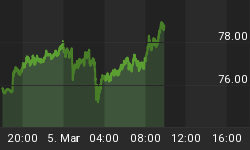The President's 2011 budget proposal was so outrageously egregious that Obama had to hold a special conference on Monday just to spin the news.
The scope of the proposed budget for fiscal 2011 is $3.8 trillion. The difference between revenue and expenditures for this fiscal year will leave us with a deficit of $1.6 trillion and, amazingly enough, that shortfall will equal 10.6% of GDP -- the highest since WWll and $200 billion more than 2009! Next year's deficit is slated to post just a $300 billion reduction to $1.3 trillion.
While it is true that "W" was a paragon of fiscal irresponsibility, it now seems past the time allotted to be able to just blame Bush for the debt. To give you a bit of perspective of how far we've gone off the fiscal rails, the budget for all of 2001 was "just" $1.9 trillion.
Going forward, the administration is projecting annual deficits between $700 and $1 trillion through 2020, which would add $8.5 trillion to the nation's debt. The annual deficit is not expected to drop below $700 billion even though they expect spending on wars to drop to $50 billion from the $159 billion that will be spent this year and next in Iraq and Afghanistan.
an inordinate amount of obfuscation in Obama's budget. It has many moving parts like the proposed cutting of 120 programs that will garner $20 billion and a fee (not a tax mind you) on the country's biggest banks that will raise $90 billion. There is also a freeze on non-defense discretionary spending that may save $250 billion over 10 years. But the freeze is only in effect for three years and then those outlays will be indexed to inflation.
But the problem of all this debt and fiscal profligacy is clear. Every dollar of debt is a promise to tax that same dollar in the future...and with interest. Estimates indicate that the publically traded debt will rise to $18.5 trillion by 2020. To compare, the total National debt outstanding today is already an unbelievable $12.3 trillion and the publically traded portion of that debt is $7.7 trillion. Having publically traded debt increase from $7.7 trillion to 18.5 trillion may result in catastrophe. It will greatly increase the odds of causing a U.S. dollar and bond market crisis.
A dramatically falling dollar and soaring bond yields will cripple our economy. We must get our fiscal and monetary house in order, today! I'm sorry to say but former Treasury Secretary Paulson's book "On the Brink" will have to be re-written and given a new title. Maybe, something like "Pushed over the Cliff" would be appropriate. A country cannot rescue the private sector by moving the debt to the public sector. In truth, we haven't bailed out the private sector at all, just mortally wounded the public sector. But there will be no one around to bail us out in the future. We have delayed and exacerbated the inevitable confrontation with our debt.
Can Mr. Geithner go hat in hand to China and ask them to let their currency rise, which means that they will have fewer dollars to buy
Treasuries; and at the same time ask them to increase their purchases of Treasuries to the tune of almost $11 trillion in the next 10 years. Does that sound like a credible strategy or a sound plan for America? President Obama, Timothy Geithner and Ben Bernanke have failed to recognize that the true nature of the problem is our debt. Their failures to allow the nation to deleverage and to use the taking on of more debt as the panacea will lead to a crisis more severe than the one most think we have avoided. The sooner we realize that, the sooner we can begin to cut spending and to the greatest extent possible, mollify the inevitable economic crisis.















